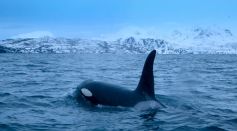ENVIRONMENT & CLIMATE

Iguana Makes a Comeback on Galapagos Islands After Being Extinct for 200 Years

New Pompeii Discovery: Archaeologists Find Ancient House That Offers a Glimpse of Middle-Class Life

Efforts to Save Malnourished Beluga Whale Stuck in France’s Seine River Continues to Fail, Experts Fear It Will Eventually Die in the Canal
Ohio Rivers Now Colored Orange, What’s Making It Look Like Paint?

Feral Horses Origin: Assateague's Horses May Finally be Revealed with Century-Old Tooth

Glaciologist Rushed Into Austria's Jamtal Glaciers to Gather Information About Distant Past

Pod of Dolphins Saved Swimmer from a Lurking 6-Foot Great White Shark: Why Are These Predators Afraid From Those Marine Mammals?

Links Between Nature and Human Well-Being Revealed in Review of Over 300 Articles on Cultural Ecosystem Services

Largest Deep Sea Fish Captured in Rare Footage at 6,000-Foot Deep Off the Coast of Japan

Why Are There More Female Sea Turtles Than Males in Florida?

Loch Ness Monster's Existence 'Plausible' After Plesiosaurs Fossils Was Discovered in Morocco's Freshwater System

Killer Whales Sink Sailboat With 5 People on Board Miles Away From Portugal Coast; Why Orcas Attack Vessels?

Polish Institute Classifies Domestic Cats as 'Invasive Alien Species' Due to the Dangers They Pose to Wildlife

Sharks Struggle With Obesity Too! Apex Predators Have Grown to 'Insane' Sizes [Report]
Most Popular

Largest Known Volcanic Aquifer Discovered Beneath Oregon's Cascades

New 'Supergiant' Sea Bug Found in South China Sea, Named After Darth Vader

Mediterranean Sea Was Refilled by a Catastrophic Flood Millions of Years Ago

Mysterious Cosmic Waves That Sound Like Birds Detected in Unexpected Space Region




